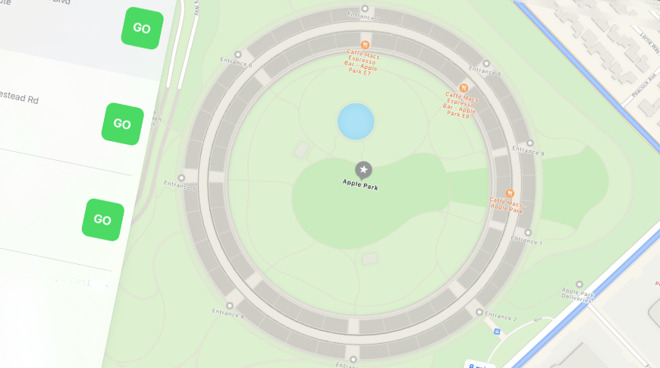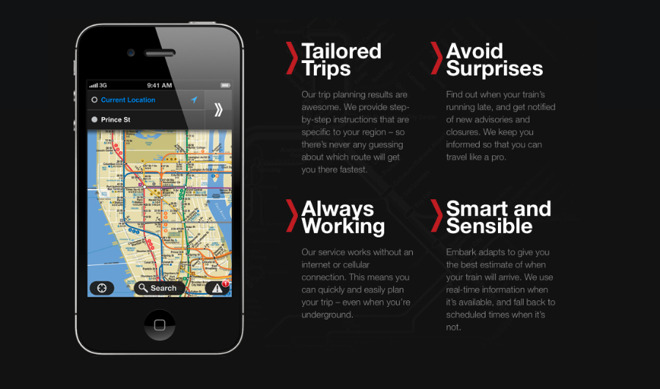Here's what it's like when Apple wants to buy your company
Six years after Apple bought his transit app firm, David Hodge has revealed the tensions, the secrecy, and the conditions that Apple puts you through while buying your firm.

The road to Apple. David Hodge has revealed how his transit app company was bought for Apple Maps
Back in 2013, while everyone else was watching Apple unveil macOS Mavericks, David Hodge was missing WWDC announcements because he was in the middle of selling his company. Even as Apple presented its news that Apple Maps was adding the 3D flyover, it was already negotiating to acquire Hodge' firm and improve future versions of its maps.
Now, six years later, Hodge has revealed a step by step account on Twitter of what happens when Apple buys your company.
In a series of 15 tweets, Hodge recounts how his company Embark was invited to visit Apple. At the time, Embark was an independent firm adding public transit features to Apple Maps in iOS 6
Ostensibly, this meeting at Apple was to discuss an improvement to a developer API that Embark wanted Apple to do.
"Turned out it was an audition for an acquisition," tweeted Hodge.
Even once Apple had made its intentions clear, and even though ultimately it did buy Hodge's Embark firm, the journey was fraught.

The Embark team circa 2013, when the company was bought by Apple.
"What's it like to sell your company?" continues Hodge. "Well, it's a hellish process that might kill your company if it doesn't work."
While Hodge does not disclose what sums Apple eventually paid for the firm, he does reveal some of his costs. Simply negotiating with Apple required legal advice that cost dearly and ate into Embark's reserves. It ate into money that Hodge describes as the company's runway, the funds it had to keep going while it was growing.
"We also managed to rack up $195,000 in legal bills for a deal that might not close," he says. "Our runway went from a comfortable [approximately] 16 months to 8."
AppleInsider has spoken off the record with other firms who have been through this process and they confirm how constantly uncertain it is. Apple has a history of looking at multiple companies for similar purposes, such as when the original iTunes was made from SoundJam instead of Panic Software's Audion.
Similarly, AppleInsider has also reported on accounts from companies such as Luna Display who say Apple "used us for market research" before producing a rival to that firm's product.
Hodge reports that Apple even bought one of his firm's rivals.
"As I was in a meeting with the [Mergers & Acquisitions] team at One Infinite Loop," he continues, "the news leaked that Apple bought our competitor Hop Stop. My phone started blowing up. What did this mean for us?"

The old Embark app before being acquired by Apple
The protracted and serious secrecy over the negotations with Apple, says Hodge, put family relationships "under heavy strain." And Hodge himself started to have physical problems.
"Wasn't sleeping well," he explains, "and had developed an excruciating issue with my jaw from apparently clenching as I slept."
On August 13, 2013, the deal was completed -- but the secrecy was not over. "We still couldn't tell anyone... So we celebrated by throwing a party for my co-founder's cat."
David Hodge and his colleagues joined Apple as part of the deal and Embark's features were incorporated into Apple Maps. Hodge stayed with Apple until 2016, shortly after which, he tweeted about the impact his company had brought to Apple Maps.
Apple's most recent improvements to its maps include the addition of the Street View-like Look Around and greater detailing, including transit improvements, to major US cities.

The road to Apple. David Hodge has revealed how his transit app company was bought for Apple Maps
Back in 2013, while everyone else was watching Apple unveil macOS Mavericks, David Hodge was missing WWDC announcements because he was in the middle of selling his company. Even as Apple presented its news that Apple Maps was adding the 3D flyover, it was already negotiating to acquire Hodge' firm and improve future versions of its maps.
Now, six years later, Hodge has revealed a step by step account on Twitter of what happens when Apple buys your company.
2. What's it like to sell your company? Well, it's a hellish process that might kill your company if it doesn't work. Also, there's lots of paperwork.
This is what my dining room table looked like on day 1 of diligence. pic.twitter.com/2u3I8hCIEU-- David Hodge (@DavidHodge)
In a series of 15 tweets, Hodge recounts how his company Embark was invited to visit Apple. At the time, Embark was an independent firm adding public transit features to Apple Maps in iOS 6
Ostensibly, this meeting at Apple was to discuss an improvement to a developer API that Embark wanted Apple to do.
"Turned out it was an audition for an acquisition," tweeted Hodge.
Even once Apple had made its intentions clear, and even though ultimately it did buy Hodge's Embark firm, the journey was fraught.

The Embark team circa 2013, when the company was bought by Apple.
"What's it like to sell your company?" continues Hodge. "Well, it's a hellish process that might kill your company if it doesn't work."
While Hodge does not disclose what sums Apple eventually paid for the firm, he does reveal some of his costs. Simply negotiating with Apple required legal advice that cost dearly and ate into Embark's reserves. It ate into money that Hodge describes as the company's runway, the funds it had to keep going while it was growing.
"We also managed to rack up $195,000 in legal bills for a deal that might not close," he says. "Our runway went from a comfortable [approximately] 16 months to 8."
AppleInsider has spoken off the record with other firms who have been through this process and they confirm how constantly uncertain it is. Apple has a history of looking at multiple companies for similar purposes, such as when the original iTunes was made from SoundJam instead of Panic Software's Audion.
Similarly, AppleInsider has also reported on accounts from companies such as Luna Display who say Apple "used us for market research" before producing a rival to that firm's product.
Hodge reports that Apple even bought one of his firm's rivals.
"As I was in a meeting with the [Mergers & Acquisitions] team at One Infinite Loop," he continues, "the news leaked that Apple bought our competitor Hop Stop. My phone started blowing up. What did this mean for us?"

The old Embark app before being acquired by Apple
The protracted and serious secrecy over the negotations with Apple, says Hodge, put family relationships "under heavy strain." And Hodge himself started to have physical problems.
"Wasn't sleeping well," he explains, "and had developed an excruciating issue with my jaw from apparently clenching as I slept."
On August 13, 2013, the deal was completed -- but the secrecy was not over. "We still couldn't tell anyone... So we celebrated by throwing a party for my co-founder's cat."
David Hodge and his colleagues joined Apple as part of the deal and Embark's features were incorporated into Apple Maps. Hodge stayed with Apple until 2016, shortly after which, he tweeted about the impact his company had brought to Apple Maps.
2/ Specifically, a year ago Apple announced Transit at WWDC. Was a highlight to eight years working on Transit / Mobility at Embark & Apple.
-- David Hodge (@DavidHodge)
Apple's most recent improvements to its maps include the addition of the Street View-like Look Around and greater detailing, including transit improvements, to major US cities.


Comments
Now, as a former Apple employee, he gets to talk about how hard it was. I'm just not sympathetic.
Your utter lack of sympathy comes off as entirely callous, and your complaint about the guy “whining” makes you sound like a frighteningly irrational corporate fanatic who cannot allow for anyone else’s unpleasant experiences with Apple to be real.
In my world that is not considered "lot's of paperwork", especially for something like an acquisition. I guess everything is relative to your own experiences. But no matter, I'm sure that getting aquired by a company like Apple is a hellish process.
I'm with '2001 on this one. I don't know if I'd call it "whining" exactly, but there's very little there that is surprising or unexpected. If you're a three-person firm looking to get acquired by a huge corporation, it's going to be stressful, time consuming, and expensive. As for that being a lot of paperwork, have you bought a house lately? Or been audited, or written a grant proposal?
Of course there are bound to be large legal fees associated with such a deal. Of course there will be lots of paper work. Of course there will be secrecy. This goes without saying.
If the dude didn't want to sell the company, then they shouldn't have done it, if they can't handle everything that comes with it.
And they will use ANY method possibly to win.
The most polite way to describe them is that “They are NOT nice.“ I would prefer to use other words, but then this post would be blocked.
They have changed my opinion 180 degrees about Apple as a company. And definitely not for the better. They can chew up small companies, and people very easily, without any regard for the companies, individual or families.
And I don’t think that Tim Cook has a clue about how ruthless his company can really be.
Okay, so yeah some of that is my problem, but some isn't. Apple can be tough to deal with both as an employee and as an acquisition target. I understand how this guy was feeling. I also recognize that they have to be this way because otherwise they will get taken advantage of. I bet there are a lot of scammy, crap companies out there that would love to get snapped up by Apple and probably pitch themselves all the time. I know Apple watches the CSRs so closely, because in the past too many did a bad job, stole hours, angered customers and generally screwed Apple over. So they have no choice but to be tough and a bit heavy handed. Knowing this is great, but it doesn't make it any easier to engage with them. Full disclosure, I'm 62 years old and was 56 when I worked for Apple.
Who certainly seems to be unaware of the pressures of running a small business, gambling your financial position, your families position, your colleagues and potentially friends, your work life balance of running a company and dealing with all of this. In a cloud of secrecy without any guarantees trying to do what's best with an incredibly difficult and often seemingly deliberately obstructive company.
I'd wager you don't have experience of the above or dealing with Apple in this regard.
Fair play to him for speaking out, it must of been difficult trying to work out if what was happening is the best thing to do or worthwhile.